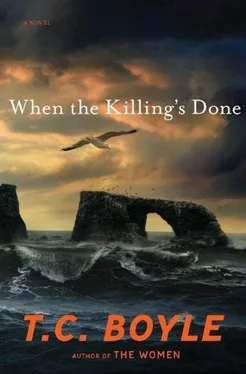The tender on an urchin boat is responsible for taking care of all the tasks the divers would prefer having done for them, from dropping and setting the anchor over a promising spot, to laying out the wetsuits and hoses, working the winch to bring the catch over the side, keeping an eye on the air compressor when the divers are down in thirty feet of icy swirling water and making a nice hot lunch to fortify them for the afternoon dives. Not to mention digging out the cold beers for the ride home. While they were down, usually in thirty-minute shifts — thirty minutes was about average for filling the steel-rimmed bag with urchins — she would entertain herself as best she could, reading through paperbacks and the piles of out-of-date magazines she got from a friend of Greg’s who worked for a dentist, doing pencil sketches of the island bluffs or just staring off into space and dreaming, one watchful eye fixed on the snaking yellow hoses as they cut the surface and plunged into invisibility. Her life, finally, seemed to fit her wanting. She’d never been happier.
Then there came a morning in August, clear and calm, what fog there was bellying across the water out front of the boat only to fall away to nothing as she sliced through it, as relaxed at the helm as a long-distance trucker cruising the interstate, while Greg and Mickey slept below. She was six months in, six months to the day — she and Greg were going to celebrate by going out to dinner and a movie when they got back that night — and she’d reached a confidence level where she did almost all the piloting, there and back, because why should her divers have to waste their energy when they could be collapsed in their bunks on the way out and slumped over their beers on the way back? Save your energy , she’d told Greg when she’d been on the job a month, squeezing his arm at the biceps as they stood rocking in the cabin and giving him her best imitation of a sex-starved leer, and he’d leered right back, kissed her deep and run a hand over her breasts and then lifted his other hand too and held them there. Sure , he’d said, why not? You know the routine as well as anybody. Just keep your eye on the gauges and listen to the engine — that’s all you need. And it was. No problem. And if anything did go wrong, she had two mechanics aboard, and she’d let them worry about it. A jolt of coffee in the morning to keep her alert, one beer only at night till they were through the shipping lanes. Watch the depth finder. Fix on a point and never deviate because if you run a crooked line you just waste fuel. Easiest thing in the world.
This morning they were headed for the west end of the island, to the kelp beds at Forney’s Cove, where they’d discovered a mother lode of urchins the day before. Alma was with her Grandmother Boyd in Venice for two weeks, all that nastiness over Greg long forgotten, or buried anyway, because when Kat finally brought her daughter home at four months — just herself, just for the day — her mother melted, and there was never another word about Japs or Nips or Orientals, at least not while Alma was around. The haul had been exceptionally good lately, the urchins of primo quality — they were taking in a thousand a day on average — and almost as plentiful as the pitted volcanic stones that littered the bottom. More and more boats were getting into the act, but they couldn’t begin to imagine any falloff in the catch — not yet. Not amidst all this abundance. Get it while you can, that was her thinking. Pay down the mortgage. Save for the future.
Greg came up from below, rubbing his eyes, when he heard the engine slow and then clank into neutral. “Here, already, huh?” he said, giving a stretch and a yawn and peering out the window at the kelp fronds spread across the water like so many grasping hands.
“Sure,” she said, “life’s a treat when you sleep all the time.”
“How’s the pepperoncini look?” That was his pet term for kelp, because it was the exact color and texture of the little pickled peppers you found in a pint of antipasto at the deli counter.
“I don’t know,” she said. “There’s a lot of it.”
He went out on deck to have a closer look — he was watching for the chewed-up leaves that indicated an urchin party was going on down below — and then, after a minute, flagged his arm for her to drop anchor. That was when Mickey crawled up out of the galley, a once-white baseball cap pulled down over his eyes and a mug of coffee clutched like a lifeline in one hand. Like Greg, he wore shorts and a sweatshirt stained with paint, motor oil and the various internal fluids of one sea creature or another. He was short and powerfully built, already balding at thirty, with a winning gap-toothed smile that gave him the look of the class wiseguy, which was precisely what he’d been. If you believed his stories. Unfortunately, he never deployed his smile or any semblance of it before twelve, twelve at least, and when he emerged from the cabin a moment later he was scowling as usual. “Man, I just do not feel like getting in that water this morning,” he said, leaning over the rail and staring numbly down into the gently heaving wash of kelp. “Why don’t you suit up for me, Kat? And I’ll just stay up here and sunbathe. And read what is it— Cosmo ? Or Better Homes and Gardens . That’s what we all need, right? Better homes, better gardens?”
“Uh-uh,” she said. “We need better hauls.” She gave him a grin, then conspicuously checked her watch. “Which means it’s time to fire up the compressor and get my divers down there where all the spiny things are.”
The compressor — Greg had rigged it up himself — was mounted on the deck just to the rear of the cabin on the starboard side, beneath the gunwale, where it would be protected from the wind and spray. She hated to pull the cord and start the thing up because the racket it made — an endlessly repeating loop of blatting exhaust that sounded like a squadron of leaf blowers pulsing out over the sea — destroyed the peace of the morning and the afternoon too. She wore foam earplugs once the boys went down, but they didn’t do much more than dampen the roar so that every word she read in her dog-eared paperbacks and sun-bleached magazines seemed to repeat itself, once on her lips and again in the floating dissociated interstices of her brain. The muffler could use replacing, that was for sure, and she’d nagged Greg about it and he’d made the usual promises, but they were getting while the getting was good and at the end of the day everybody felt as if they’d run a marathon and none of them wanted to think about maintenance — maintenance was a concept better suited to the storm-struck days of January and February, when the urchins were spawning and there were whole weeks filled with rotating spirals of nothing.
The motor caught on the first pull— Vrrrr-rap-rap-rap —and they had to shout at each other while she paid out the hoses and Greg and Mickey pulled on their wetsuits, flippers, masks and weights. Then they were overboard in a black churn of water, suspended there against the opaque depths for a fraction of a moment before they were gone. For a while, out of habit — or boredom, because what was else was there to do? — she watched their bubbles rise to the surface and then diverge as each went his own way, intent on the clusters of spiny black echinoderms that had only to be pried loose and slipped into the mesh bag that trailed behind them, to the tune of twenty-eight cents a pound.
A breeze had come up as she leaned there over the rail, dreaming, letting her gaze wander across the surface to the white crescent of beach five hundred yards away and the sun-bleached hills that rose beyond it. The boat swung on its anchor. A chop — white-flecked, sudsing — ran before the breeze and erased the air bubbles. The gas motor that ran the compressor missed, sputtered, then straightened out in a high whine, the exhaust flatulating through the pinprick holes the sea air had worked through the muffler. The breeze was cold, sucking the chill from the waves like a giant air conditioner, and she went down in the cabin to get her sweatshirt. On her way back through the galley she stopped to pour a third cup of coffee and make herself a ham and Swiss on rye with a slice of sweet onion and plenty of mustard, which she seared in the pan so it would be nice and gooey, just the way she liked it, and then she was back on deck. They’d been down twenty minutes — perfect — so she’d have time to enjoy her sandwich and linger over her coffee before they came up and she’d have to winch the bags up on deck. And that was always exciting, a break in the routine, the secret shy animals spilled across the boards, their spines waving and coalescing as if to assess the threat of an alien atmosphere, one of poisonous air rather than sustaining water, before she stored them in the darkness of the hold. Which required care — any prick of the spines, no matter how cursory, always got infected, and if one went in deep and broke off, you could kiss twenty-five dollars goodbye because you were going to need the doctor to dig it out and clean up the wound. Erizos del mar , hedgehogs of the sea, that’s what the Mexicans called them. Or sometimes, just heriditas , little wounds.
Читать дальше












